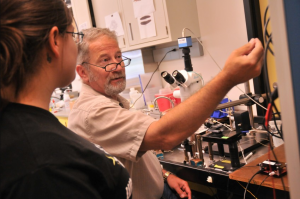Name
Office (Phone#) |
Email |
Research Interests |
Undergraduate projects |
Stephen T. Abedon
Mansfield Campus (419-755-4343) |
abedon.1@osu.edu |
Bacteriophage Evolutionary Ecology. |
— |
Brian M. Ahmer
934 Riffe Bldg
(292-1919) |
ahmer.1@osu.edu |
Regulatory Networks in Pathogenic bacteria |
— |
Irina Artsimovitch
428 Biosci Bldg
(292-6777) |
artsimovitch.1@osu.edu |
We study regulation of transcription in bacteria using primarily biochemical and molecular genetics approaches. We use RfaH, a bacterial protein required for pathogenesis, as a model system to dissect molecular mechanisms by which regulatory proteins affect activity of RNA polymerase. |
Specific projects suitable for undergraduate research include: (i) analysis of RfaH mutants; (ii) analysis of RfaH effect on gene expression using reporter constructs; (iii) identification of RfaH-responsive elements in bacterial genomes. |
Neil R. Baker
541 Biosci Bldg
(292-3342) |
baker.2@osu.edu |
Pathogenicity of Gram-Negative Pathogens |
— |
Paula Wolf Bryant
909 Biosci Bldg
(247-7694) |
bryant.218@osu.edu |
The Role of MHC Class II-restricted Antigen Presentation in Pathogen and Tumor Immunity |
— |
Charles J. Daniels
428 Biosci Bldg
(292-6777) |
daniels.7@osu.edu |
Molecular Biology of the Archaea: Transcription and Gene Regulation in the Archaea, RNA Processing and Genome Analysis |
— |
| Kurt Fredrick
417 Biosci Bldg
(292-6679) |
fredrick.5@osu.edu |
There are two independent projects in my lab: (1) understanding how the ribosome functions and (2) understanding how bacteria influence insect reproduction. |
Students have the opportunity to learn techniques in molecular biology, microbiology, biochemistry, and cell biology. |
Tina M. Henkin
904 Riffe Bldg
(688-3831) |
henkin.3@osu.edu |
My laboratory is interested in regulation of gene expression in bacteria at the level of premature termination of transcription, with Bacillus subtilis as our model system. |
— |
Michael Ibba
556 Biosci Bldg
(292-2120) |
ibba.1@osu.edu |
Our lab works on protein synthesis in bacteria. |
We have openings for undergraduates interested in gaining experience in the areas of microbiology, molecular biology and biochemistry through participating in ongoing research projects. |
Pravin T. Kaumaya
316 Medical Res.
Ctr (292-7028) |
kaumaya.1@osu.edu |
Peptide and Protein Design, Antigenic and Immunogenic Determinants, Peptide and Protein Folding, Cancer Vaccines, Immunotherapy, Autoimmune Diseases, and Transplantation |
— |
Joseph A. Krzycki
914 Riffe Bldg.
(292-1578) |
krzycki.1@osu.edu |
Our lab works on methanogens, members of the Archaea that make most of the world’s biologically produced methane. We recently discovered that these organisms possess a never before seen amino acid. This amino acid is encoded by amber codons in certain genes required to make methane. Amber codons are usually stop codons—but in these methanogens, they now act as sense codons. |
Undergraduates in our lab would work on some aspect of how this novel amino acid is made, and why the methanogens have changed their genetic code to include a new amino acid. They would also work on projects to uncover other organisms in nature that possess this novel amino acid. |
Mark Morrison
Animal Science
230 Plumb Hall
(688-5399) |
morrison.234@osu.edu |
Molecular Biology of Cellulose Degradation and Bacterial Adhesion to Surfaces |
One student is working on a proteomics-based analysis of bacterial responses to growth on cellulose and other polysaccharides. Another student is using Ribosomal Intergenic Spacer Analysis (RISA) to examine the microbial communtities present in the digestive tract of animals. |
Richard F. Mortensen
555 Biosci Bldg
(292-3360) |
mortensen.3@osu.edu |
We are investigating two related research projects that examine the cell-signalling pathways triggered by blood proteins that mediate innate or nonspecific host resistance. The projects look at both positive and negative (regulatory) signaling mechanisms in monocytes and neutrophils, using human cell lines. |
The technology used is cell culture, biochemistry, and immunochemistry. |
Robert S. Munson
Pediatrics
Children’s Hospital
(722-2778) |
munson.10@osu.edu |
— |
— |
John N. Reeve
376 Biosci Bldg
(292-2301) |
reeve.2@osu.edu |
We are investigating the molecular biology of microorganisms that live in boiling thermal vents and frozen in ice in glaciers. Specifically, we are determining how their proteins and DNA are stabilized and still function in such extreme environments |
— |
Abhay Satoskar
917 Biosci Bldg
(292-3243) |
satoskar.2@osu.edu |
The leishmaniases comprise several diseases caused by intracellular protozoan parasites belonging to Leishmania species leading to a wide spectrum of clinical manifestations and a global health problem. |
Our laboratory is interested in understanding the immune mechanisms that determine outcome of “New world” cutaneous and visceral leishmaniasis caused by L. mexicana and L. donovani respectively. |
F. Robert Tabita
700 Riffe Bldg
(292-4297) |
tabita.1@osu.edu |
We are interested in the regulation of microbial carbon, nitrogen, and hydrogen metabolism. |
Students would be involved in projects that use molecular microbiology, biochemistry, genomics, and proteomics techniques. |
Olli H. Tuovinen
622 Biosci Bldg
(292-3379) |
olli.tuovinen@osu.edu |
Environmental and Industrial Microbiology |
— |
Marshall V. Williams
2074 Graves Hall
(292-0717) |
williams.70@osu.edu |
Herpesviruses and Mutagenesis |
— |
Ahmed E. Yousef
217 Parker Hall
(292-7814) |
yousef.1@osu.edu |
Food Microbiology, Microbial Safety of Food |
— |
Bruce S. Zwilling
612 Biosci Bldg
(292-3310) |
zwilling.1@osu.edu |
Mycobacterial Resistance, Macrophage Activation, Regulation of Macrophage Gene expression by Corticosteroids and Neuroimmunology |
— |

